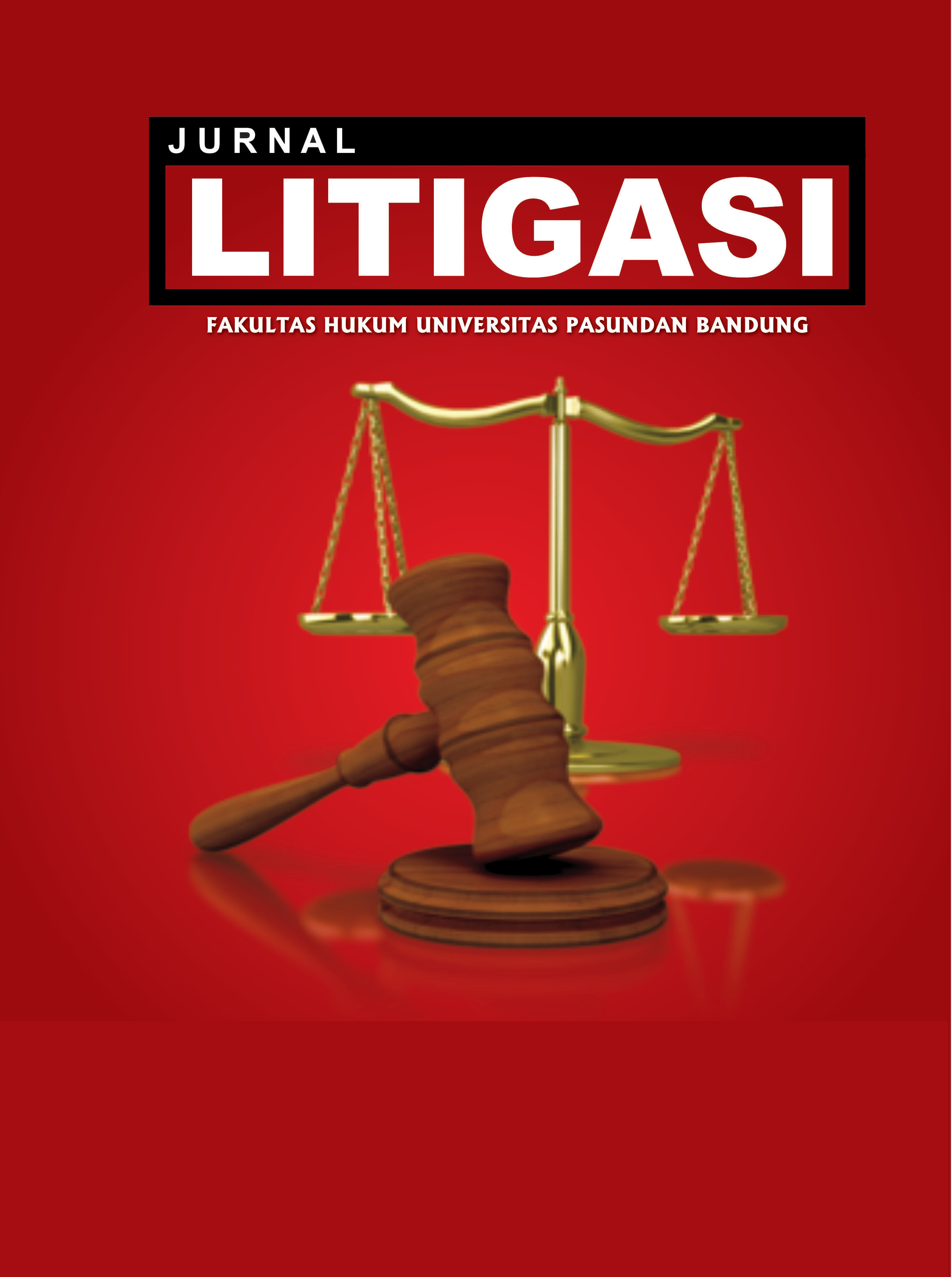KONSTRUKSI YURIDIS PENGATURAN BANTUAN JURU BAHASA BAGI TERDAKWA
DOI:
https://doi.org/10.23969/litigasi.v25i2.17359Keywords:
Interpreter, defendant, Human RightsAbstract
The defendant has the right to present a defense, and to guarantee that the defendants must understand the facts that arise during trials. The Indonesian Criminal Procedure Code (KUHAP), yet still superficial, does regulate the mechanism for appointing an interpreter. This study aims to elaborate: first, the urgency of an interpreter during trial; and second, how the law regulates the existence of an interpreter assistance for defendants. This research uses a normative juridical method. Based on the problem mentioned above, the conclusion is as follows: First, the appointment of an interpreter aims to ensure equality between the defendant and the prosecutor. Those conditions will lead to a verdict based on substantive truth by the judge. Second, the judge must use an official decree to appoint an interpreter, granting them legal authority during the trial. Before the interpreter translates any facts in the trial, they must first take an oath or pledge. An interpreter who provides intentionally false translations will be charged under Article 242 of the Criminal Code. Additionally, an interpreter who has been appointed but fails to fulfill their duties can be penalized under Article 224 paragraph (1) of the Criminal Code, and if the interpreter unlawfully fails to appear, they can be penalized under Article 522 of the Criminal Code. This study recommends that future reforms of the Criminal Procedure Code explicitly state that judges should appoint interpreters through official decrees and interpreters should be certified and integrated into the criminal justice system.
Downloads
References
Efendi, J., & Ibrahim, J. (2018). Metode Penelitian Hukum Normatif dan Empiris. Kencana.
Effendi, E. (2021). Hukum Acara Pidana Perspektif KUHAP dan Peraturan Lainnya. PT. Refika Aditama.
Fauziah Lubis. (2020). Bunga Rampai Hukum Acara Pidana. CV. Manhaji.
Hopkins, A. (2015). Equality before the Law: The Importance of Understanding the Experience of’others’ in the Criminal Justice System [University of Canberra]. https://researchsystem.canberra.edu.au/ws/portalfiles/portal/33677769/file
Kwakman, N. J. M. (2017). De illusie van de materiële waarheid en de houdbaarheid van de doelstelling van de materiële waarheidsvinding in het strafproces. Strafblad, 6, nr. 64.
Lamintang, P. A. F., & Lamintang, T. (2013). Pembahasan KUHAP Menurut Ilmu Pengetahuan Hukum Pidana & Yurisprudensi. Sinar Grafika.
Langford, I. (2009). Fair Trial : The History of an Idea . Journal of Human Rights, 8(1), 37–52. https://doi.org/10.1080/14754830902765857
Lanza, G. (2020). Fake News and the Challenges of Criminal Law. Journal of Eastern European Criminal Law, 2. https://www.researchgate.net/profile/Marina-Matic-Boskovic/publication/357096094_Implications_of_New_Technologies_on_Criminal_Justice_System/links/61bb72884b318a6970e7943c/Implications-of-New-Technologies-on-Criminal-Justice-System.pdf#page=33
Lubis, A. F. (2023). The Right to a Fair Trial: Comparative Analysis of International Human Rights Standards. The Easta Journal Law and Human Rights, 1(03). https://doi.org/10.58812/eslhr.v1i03.88
Lumempouw, B. (2013). Hak Terdakwa Melakukan Upaya Hukum Dalam Proses Peradilan Pidana. Journal of Chemical Information and Modeling, 53(9).
McEvoy, G. (2023). Language proficiency and the right to an interpreter when accessing a fair trial. Translation and Interpreting, 15(2). https://doi.org/10.12807/ti.115202.2023.a09
Meyerson, D., & Mackenzie, C. (2018). Procedural justice and the law. Philosophy Compass, 13(12). https://doi.org/10.1111/phc3.12548
Naufal, R. S., Rusmiati, E., & Ramdan, A. (2021). Urgensi Pembaharuan Hukum Autopsi dalam Proses Penyidikan Tindak Pidana Pembunuhan untuk Mencapai Kebenaran Materiil. Jurnal Legislasi Indonesia, 18(3). https://doi.org/10.54629/jli.v18i3.737
Nugroho, B. (2017). PERANAN ALAT BUKTI DALAM PERKARA PIDANA DALAM PUTUSAN HAKIM MENURUT KUHAP. Yuridika, 32(1). https://doi.org/10.20473/ydk.v32i1.4780
Prasetyo, T., & Kameo, J. (2020). PERADILAN HAK ASASI MANUSIA: SUATU PERSPEKTIF MENURUT JURISPRUDENCE KEADILAN BERMARTABAT Teguh Prasetyo 1 , Jeferson Kameo 2. Jurnal Ilmu Hukum, 15(2).
Purukan, A. F. (2019). Delik Tidak Memenuhi Pelaksanaan Kewajiban Sebagai Saksi, Ahli Atau Juru Bahasa Menurut Pasal 224 Dan Pasal 522 Kuhp. Lex Crimen, VIII(8).
Rogers, A., Hine, K., Prenzler, T., Rogers, A., Hine, K., & Prenzler, T. (2024). Understanding the decline : a procedural justice approach to the key factors behind the downward shift in opinions of police police. Criminal Justice Studies, 00(00), 1–24. https://doi.org/10.1080/1478601X.2024.2329955
Saunders, N. (2023). Security, digital border technologies, and immigration admissions: Challenges of and to non-discrimination, liberty and equality. European Journal of Political Theory. https://doi.org/10.1177/14748851231203912
Sherman, J. (2016). The Right to an Interpreter under Customary International Law. SSRN Electronic Journal. https://doi.org/10.2139/ssrn.2773013
Spohn, C., Verhagen, M., & Walker, J. (2022). Revisting Sentencing Reform. In J. B. Gould & P. R. Metzger (Ed.), Transforming Criminal Justice. New York University Press.
Yosua, K., Dientje, R., & Turangan, D. D. (2022). Peranan Saksi, Ahli, dan Juru Bahasa Bagi Peradilan Pidana. Lex Crimen, 11(2).
Zemach, A. (2011). Reconciling Universal Jurisdiction with Equality Before the Law. Texas international law journal, 47(1).
Downloads
Submitted
Accepted
Published
How to Cite
Issue
Section
License
Copyright (c) 2024 LITIGASI

This work is licensed under a Creative Commons Attribution-ShareAlike 4.0 International License.
Copyright © 2026 Jurnal LITIGASI (e-Journal).
Jurnal LITIGASI (e-Journal) adopts the CC-BY license as the optimal license for publishing, distributing, using, and reusing scholarly work. Authors who publish with this journal retain copyright and grant the journal right of first publication with the work simultaneously licensed under a Creative Commons Attribution 4.0 International License (CC-BY 4.0). This license allows others to share, copy, distribute, and adapt the work, provided that the work's authorship and initial publication in this journal are properly cited.






























